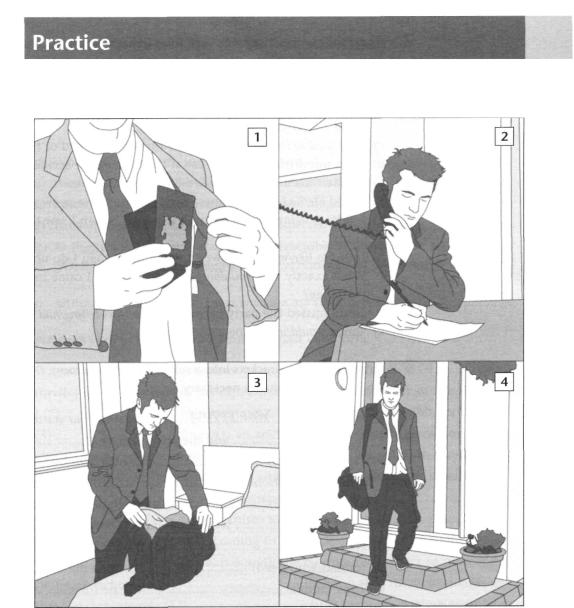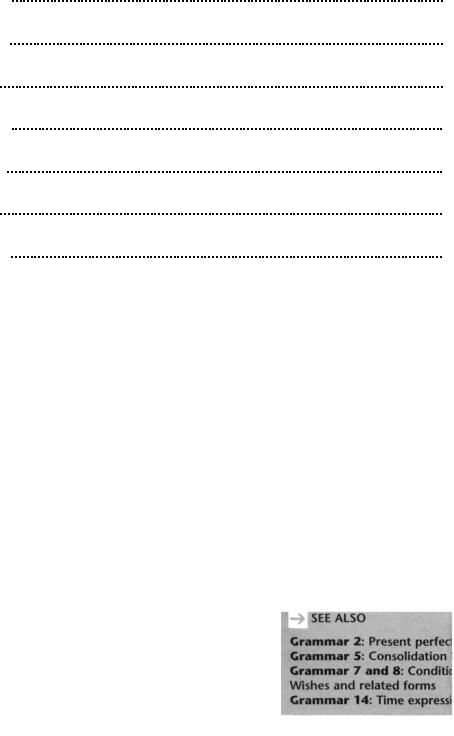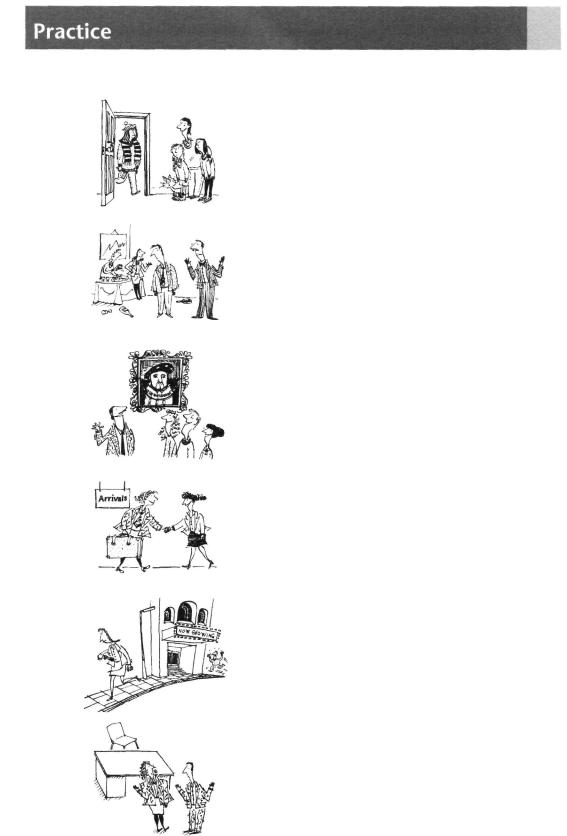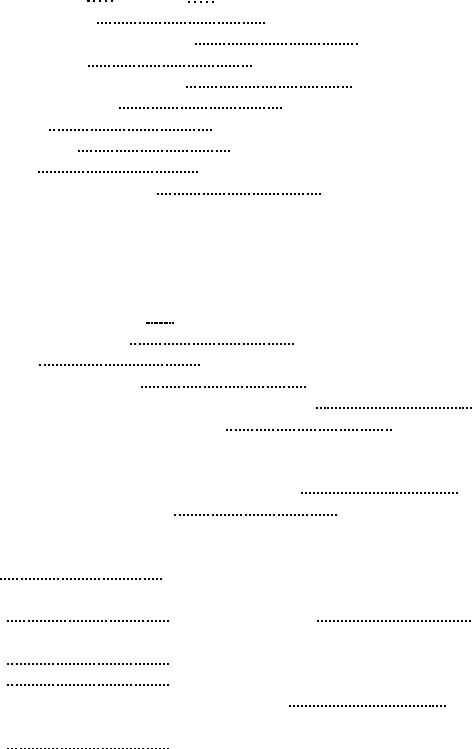
English_books / MacMillan-FCE.Language.Practice.With.Key(M.Vince) nen in
.pdf
G R A M M A R 1 PAST T I M E
Choose a suitable description for each picture.
a)When he left the house, Peter forgot that he had put his passport and wallet in his other jacket.
b)After phoning the airport, Peter packed his suitcase.
c)When he returned from Portugal in March, Peter put his passport and wallet in his jacket pocket.
d)A few days before leaving for his summer holiday, Peter phoned the airport to check his flight.
e)While Peter was packing his suitcase, he realised that he hadn't checked his flight.
f)While Peter was packing his suitcase, the phone rang.

FIRST CERTIFICATE LANGUAGE PRACTICE
2Underline the most suitable verb form in each sentence. The first one is done for you.
a)I suddenly remembered that I forgot/had forgotten my keys.
b)While Diana watched/was watching her favourite television programme, there was a power-cut.
c)Tom used to live/would live in the house at the end of the street.
d)Who was driving/drove the car at the time of the accident?
e) By the time Sheila got back, Chris went/had gone.
f)David ate/had eaten Japanese food before, so he knew what to order.
g)I did/was doing some shopping yesterday, when I saw that Dutch friend of yours.
h)I used to like/was liking sweets much more than I do now.
i)What exactly were you doing/did you do when I came into your office yesterday?
j)Laura missed the party because no-one was telling/had told her about it.
k)Tanya would/used to be a doctor.
3Put each verb in brackets into a suitable past verb form. Only use the past perfect where this is absolutely necessary.
a) |
While I (try) |
was |
trying |
to get my car started, a passing car (stop) |
|
|
|
|
and the driver (offer) |
to help me. |
|
b) |
The police (pay) |
|
|
no attention to Clare's complaint |
|
|
because she (phone) |
|
them so many times before. |
||
c) |
Mary (not wear) |
|
|
her glasses at the time, so she (not notice) |
|
|
|
|
what kind of car the man (drive) |
|
|
d) |
Nick (lie) |
|
|
down on the grass for a while, next to some |
|
|
tourists who (feed) |
|
the ducks. |
|
|
e) |
Tony (admit) |
|
|
that he (hit) |
the |
|
other car, but said that he (not damage) |
it. |
|||
f) |
Sorry, I (not listen) |
|
to you. I (think) |
|
|
|
|
|
about something else. |
|
|
g) |
Helen (feel) |
|
|
very tired, and when she (finish) |
|
|
|
|
her work, she (fall) |
asleep. |
|
h) |
The police (get) |
|
|
to Clare's house as fast as they could, |
|
|
but the burglars |
(disappear) |
|
|
|
i) |
I (phone) |
|
|
you last night but you (not answer) |
|
|
|
|
What (you do) |
? |
|
j) |
We (not go) |
|
|
out yesterday because it |
(rain) |
4

G R A M M A R 1 PAST T I M E
4 Decide whether the verb form in italics is suitable or unsuitable.
a) While I had a bath, someone knocked on the door |
unsuitable... |
b) Sally didn't go to a boxing match before
c)Harry tried to repair the car, but he didn't really know what he was doing.
d)What did you wear to the Ponsonby's party?
e)Were you eating spaghetti every day when you lived in Italy?
f)I didn't know you had bought a new car
g)They all wanted to believe her, but suspected she was lying
h)As Peggy walked home, she tried to remember what happened
i)'What a terrible day!' thought Lucy. Everything had gone wrong!
j) Although it rained a lot, I was enjoying my holiday last year
5 Put each verb in brackets into a suitable past verb form.
When Professor Mallory, the famous archaeologist, (1) ...invited.
(invite) me to take part in his expedition to find the Lost City of the Himalayas,
I (2) |
(not hesitate) to accept his invitation. Mallory |
||
(3) |
(discover) an ancient map showing the position of the |
||
city, although no European (4) |
(ever go) |
to the area before. |
|
In fact, most of Mallory's colleagues either (5) |
(believe) |
||
that the city (6) |
|
(never exist) or (7) |
(feel) |
that it (8) |
(vanish) long ago and (9) |
|
|
(become) simply a legend. According to the Professor, the builders of the city
(10) |
(hide) it among the mountains in order to protect its |
||
immense riches. He (11) |
(believe) that the descendants of |
||
these ancient people (12) |
(still keep) themselves apart from |
||
the rest of mankind for the very same reasons. So when we |
|
||
(13) |
(set off) on a cool May morning towards the distant |
||
mountains, each of us (14) |
(look forward) |
to exciting |
|
discoveries. For a week or more we (15) |
(climb) higher and |
||
higher, following the map, which Mallory (16) |
(study) from |
||
time to time. Then one afternoon, while we (17) |
(rest) at the |
||
top of a valley, we (18) |
|
(notice) that a rider on a horse |
|
(19) |
(wave) at us from the other side of the valley. A rider |
||
whose clothes (20) |
(shine) like gold! |
|
|

FIRST CERTIFICATE LANGUAGE PRACTICE
6Rewrite each sentence beginning as shown. Use a participle clause.
a)Norman collected the parcel, but then he realised it was the wrong one. After collecting the parcel, Norman realized it was the wrong one.
b)Sue left the house but first she checked that she had her keys. Before
c)Mark was parking his car when he noticed the wing-mirror was broken. While
d)Julia cleaned the house, but then she fell asleep on the sofa. After
e)Brian bought a new television, but first he checked all the prices. Before
f)Alan was skiing in Switzerland and met his old friend, Ken. While
g)Kate took two aspirins, and then she felt a lot better. After
h)Sheila went out for the evening, but first she washed her hair. Before
K ey p o i n t s |
1 |
The past simple describes completed events in the past, such as the main events |
|
|
|
in a narrative. It can also describe habits and routines in the past. |
|
|
2 |
The past continuous is used for: |
|
|
|
a) |
background description. |
|
|
b) |
actions in progress, often contrasted with a sudden event. |
The past continuous cannot be used to describe past routines and habits.
3Participle clauses can introduce a clause giving the main event. The subjects of both clauses must be the same.
4The past perfect describes a past event which took place before another past event. If before or after is used, the past perfect is optional.
The past perfect is not used for an event that happened a long time ago in the past.
5Used to only refers to past time, and has no present form.
6Would can be used to describe habitual actions in the past, usually in writing. It does not make such a strong contrast with the present as used to. Compare:
Jim |
would always |
make his mother a cup of tea after lunch. |
Jim |
used to drink |
tea, but now he prefers coffee. |
Would cannot be used to describe states.
Sally used to be a dancer.

|
Explanations |
|
Recent events |
Present perfect simple |
|
|
The present perfect simple is used to describe recent events. |
|
|
|
I've left my shopping bag behind. |
|
The event happened in the past, but there is a result in the present. |
|
|
|
I've broken my arm, as you can see. |
|
No definite time is given for the event, but to emphasise the idea of recentness |
|
|
we can use just. |
|
|
|
I've just broken my watch. |
|
We can also describe events that have not happened. |
|
|
|
/ haven't found her phone number yet. |
Indefinite events |
• |
Present perfect simple |
|
|
No definite time is given for the events. They are a series of actions in our |
|
|
life up to now. |
|
|
I've been to France three times. |
|
|
After It's/This is the first/second time we use the present perfect. It also refers |
|
|
to our life up to now. |
|
|
This is the first time I have eaten Japanese food. |
|
• Compared with past simple |
|
|
|
Events described using the past simple have definite times. |
|
|
/ went to France last year. |
|
|
I ate at a Japanese restaurant on Saturday. |
|
|
If we think of a definite place for an event, this may suggest a definite time. |
|
|
/ left my shopping bag on the train. |
Extended or |
• |
Present perfect simple |
repeated events |
|
The present perfect simple describes a state which lasts up to the present. |
|
|
I've lived in this house for five years. |
|
|
The present perfect simple can describe a habitual action in a period of time |
|
|
up to the present. |
|
|
I've never worn a tie to work, and I refuse to start now! |
•Present perfect continuous
The present perfect continuous can also describe a state which lasts up to the
present moment.
I've been living in this house for five years.
There is little difference in meaning between simple and continuous in this case, or with How long questions.
How long have you lived/been living in this house?
The verbs wait, sit, lie, stay prefer the present perfect continuous.
I've been waiting for ages.
7
FIRST CERTIFICATE LANGUAGE PRACTICE
For, since, ago |
See Grammar 14 for contrast between these time expressions. |
Present perfect |
• Completed action |
simple or |
The present perfect simple can show that an action is complete. |
continuous? |
I've finished my homework! |
|
If we say how many or how much we use the simple form. A certain amount |
|
has been completed. |
|
I've written ten pages of my homework! |
•Not completed
The present perfect continuous can show that an action is not completed, or that it has finished recently.
We've been walking for hours! Let's have a rest.
I've been digging the garden. That's why I'm so dirty!
•Present result or action in progress
We use the present perfect simple if our attention is on the present result.
I've written my homework. Now I can watch the television.
We use the present perfect continuous if our attention is on the action in progress.
I've been writing my homework all evening! I didn't know it would take so
long.
8

G R A M M A R 2 PRESENT PERFECT
Choose a suitable description for each picture.
a)
l) Did you enjoy the match?
2) Have you enjoyed the match?
b)
1) What have you been doing?
2) What have you done?
C)
1) He was married six times.
2) He has been married six times.
d)
1) How long have you been here?
2) How long are you here for?
e)
1) I've been waiting for two hours.
2) I waited for two hours.
f)
1) Where did Wendy go?
2) Where has Wendy been?
9

FIRST CERTIFICATE LANGUAGE PRACTICE
2.Underline the most suitable verb form in each sentence.
a)Did you see/Have you seen my bag anywhere? I can't find it.
b)Larry is writing/has been writing/has written his novel for the last two years.
c)From the minute he got up this morning Gary asked/has asked/has been asking silly questions!
d)Have you given/Did you give Helen my message when you have seen/saw her?
e)Sorry, could you say that again? I didn't listen/haven't listened/haven't been listening to you.
f) The police think that they found/have found your wallet, so call this number.
g)Did you two meet/Have you two met before? Eric, this is Amanda,
h)Did you meet/Have you met anyone interesting at the reception?
3 Put each verb in brackets into a suitable verb form.
a) |
I'm sorry about not coming last week. I (have) |
had. |
a |
|
|
cold and so I (stay) |
at home. |
|
|
b) |
Wait a minute! I (have) |
an idea. Let's go and see |
||
|
Roger. We last (see) |
him a long time ago. |
|
|
c) |
It's nice to be back here in London. This is the second time I (come) |
|||
|
here. |
|
|
|
d) I'm phoning about your bicycle for sale, which I (see) |
|
|
||
|
in the local paper. (you sell) |
it? Or is it still available? |
||
e) |
This place is in a terrible mess! What on earth (you do) |
|
? |
|
f) |
And now for an item of local news. Hampshire police (find) |
|
||
|
the dangerous snake which (go) |
|
|
|
|
missing earlier in the week. |
|
|
|
g) |
This tooth (kill) |
me lately! So I (make) |
|
|
|
an appointment with the dentist for next Tuesday. |
|||
h) |
I can't give you the report I (promise) |
|
for |
today |
|
because I (not finish) |
it. |
|
|
4Underline the most suitable time expression.
a)I haven't seen Gerry for/since a long time. How is he?
b)It's ages ago/since I last went to a football match.
c)I've written to Deborah last week/recently.
d)What have you been doing today/yesterday?
e)Have you eaten Italian food before/already?
f)I've been living here in/since the end of last year.
g)Actually I had dinner with Sue last night/lately.
h)I've been trying to get in touch with David for ages/for the last time.
i)Terry hasn't been to Edinburgh since/when we went there together.
.j) I can't remember how long/when I've had this watch.
10

G R A M M A R 2 PRESENT PERFECT
5Complete the second sentence so that it has a similar meaning to the first sentence, using the word given. Do not change the word given. You must use between two and five words, including the word given.
a)Steve started learning the violin a month ago. learning
Steve |
has |
been |
learning |
b)I haven't been to an Indian restaurant for ages. since
the violin for a month.
It's ages |
an Indian restaurant. |
c)When she heard the results, Mary began to feel more confident. become
Since hearing the results |
more |
confident. |
|
d)The last time Nancy came here was in 1986. since
Nancy hasn't |
1986. |
e)This is my first visit to Japan. time
This is the first |
to Japan. |
f)How long have Helen and Robert been married? get
When |
married? |
g)Jack bought those trousers last month, and has been wearing them ever since.
for
Jack has |
a month. |
h)It's a long time since our last conversation. spoken
We |
long time. |
i) Thanks, but I had something to eat earlier. |
|
already |
|
Thanks, but I've |
eat. |
j) This is my first game of water-polo. |
|
played |
|
I |
before. |
11

FIRST CERTIFICATE LANGUAGE PRACTICE
6Put each verb in brackets into either the present perfect simple or the present perfect continuous.
a) |
Someone (eat) |
has |
eaten |
all the cakes. I'll have to buy some more. |
b) |
What (you buy) |
|
your sister for her birthday? |
|
c) |
My throat is really sore. I (sing) |
all evening. |
||
d) |
Brenda (learn) |
|
|
Russian, but she finds it difficult. |
e) |
How many people (you invite) |
to your party? |
||
f) |
Those two cats (sit) |
|
on that branch for the last hour. |
|
g) |
It (rain) |
|
|
all day! Why can't it stop? |
h) |
Diana (wear) |
|
|
twelve different dresses in the past week! |
i) |
I (do) |
|
|
everything you asked. What should I do now? |
j) |
Graham and Pauline (try) |
to find a house for ages, |
||
|
but they can't |
find one |
they can afford. |
|
7Put each verb in brackets into either the past simple, the present perfect simple, or the present perfect continuous.
It was announced in London this morning that the British Oil Corporation
(1) |
...has |
discovered |
(discover) oil under the sea near the Welsh coast. |
|
The company, which (2) |
(drill) for oil in the area since |
|||
2001, (3) |
|
(find) small amounts of oil near Swansea last |
||
month, and since then (4) |
(discover) |
larger amounts |
||
under the seabed nearby. Last year the government (5) |
|
|||
(lend) over £50,000,000 to BOC, and (6) |
(give) |
|||
permission for the company to build an oil refinery and other facilities in South Wales.
|
The reaction of local people to today's news (7) |
|
(be) mixed so far. Local MPs (8) |
(already welcome) the |
|
news, pointing out that the oil industry will bring badly needed jobs to the |
||
area. But local residents are worried about the danger of pollution. 'Nobody |
||
(9) |
(ask) us yet what we want,' said Ann Griffiths, |
|
leader of the Keep Out The Oil Campaign. 'Look what |
|
|
(10) |
(happen) when they (11) |
|
(find) oil in Scotland in the 1960s. The oil companies |
|
|
(12) |
(get) rich, not the local people. BOC |
|
(13) |
(not tell) us the truth about what this is going to |
|
mean for our people.' A BOC spokesman later (14) |
|
|
(refuse) to comment. Meanwhile local campaigners |
|
|
(15) |
(ask) the government to hold an inquiry. |
|
12
